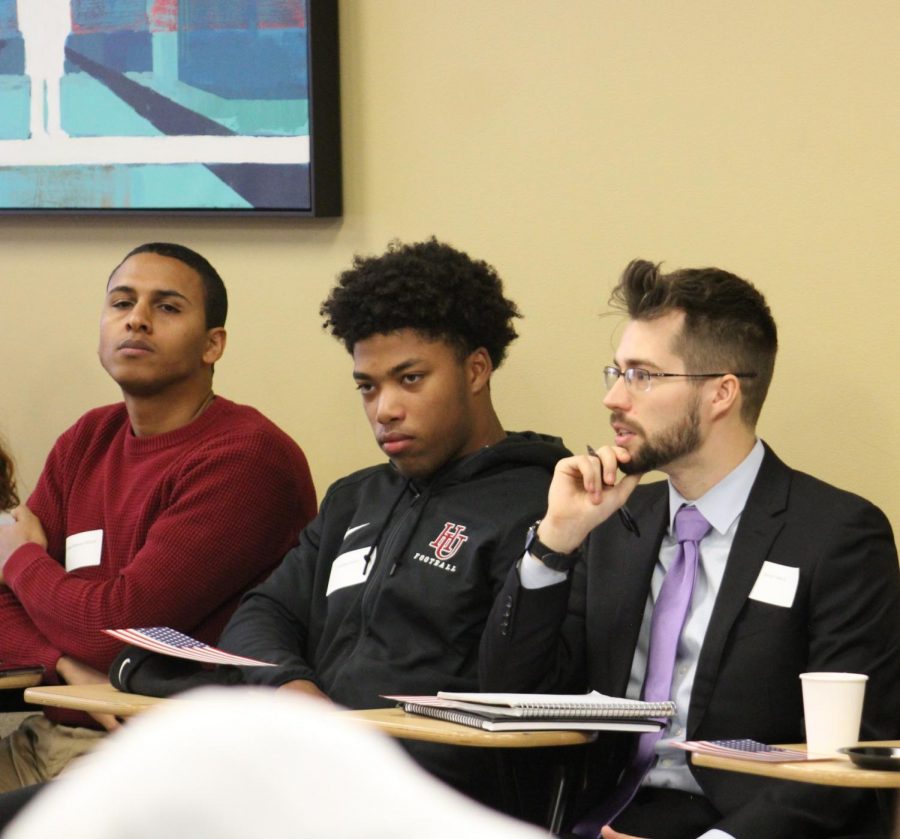“Our duty is to tell people truth”
Edward R. Murrow journalist fellows mentor Hamline students and talk fake news during a state-sponsored visit.
Hassan Mahmoud Jiddah, Manny Moton and Devan Flaherty listen intently to ongoing discussion.
November 16, 2018
Journalists representing 23 countries met with Hamline students studying communications and journalism on Saturday, Nov. 10 for a roundtable discussion about the importance of fact-checking and journalistic integrity.
The visiting journalists represented radio, broadcast and print outlets from a variety of countries including Albania, Thailand, Ghana, Egypt and the Bahamas. As part of the Edward R. Murrow Fellows and the Correspondent Exchange Network (CEN) through the U.S. Department of State, they came to Hamline to provide insight and advice.
“In these programs, we try to make sure that we represent all socio-economic, regional perspectives, a different political spectrum, etc.,” said Tahra Vose, a foreign service officer for the Bureau of Education and Cultural Affairs (ECA).
Their visit to Hamline was arranged solely by Communications Professor Suda Ishida, whose connections with Global Minnesota, a non-profit providing globalized learning, allowed her to coordinate the visit. Hamline is the first university the fellows will visit during their three-week stay.
“Hamline has the privilege to have them as mentors for inspiration, curiosity about the world and global citizenship,” Ishida said.
The discussion between the fellows and students focused largely on the role of media and news ethics in their respective countries.
“As a journalist, you must be a crusader,” said John Sam Arthur, a radio broadcaster from Ghana. “You must be a voice for the voiceless.”
Other journalists stressed the importance of fact-checking, even in the face of pressure from editors, politicians or deadlines for big stories.
“Journalists should never be a tool in somebody’s hands,” said Grzegorz Pawel Zasepa, entertainment journal deputy editor-in-chief in Poland.
Zasepa drew from his experience as a crime reporter to emphasize the necessity for journalists to share facts without agenda, regardless of how they feel about the subject.
“Our duty is to tell people truth,” Zasepa said. “On the other hand, we must remember who we are. We are journalists. We are not law officers, we are not prosecutors.”
Senior broadcast reporter Elmy Lung, who works for Television Broadcasts Limited in Hong Kong, noted that every journalist has personal stakes in getting their facts right in every story.
“As a journalist, we all have reputations to think about, even if we’re under pressure from an editor. It’s got your byline and you’re the one who will have to live with a bad reputation, and that will affect you.”
For some of these reporters, one wrong fact or a topic that is not handled sensitively can lead to significant consequences.
“Some of them are coming from extremely difficult situations,” Vose said. “I’ve dealt with reporters who have been arrested multiple times, beaten, you name it.”
Collecting accurate facts and reliable sources is an everyday necessity for journalists all around the world.
Reporter and senior producer at a radio station in Nigeria, Olubunmi Adama Khafayat Yekini follows the saying, “when in doubt, leave it out.”
Both professional and student journalists agreed that maintaining transparency and accuracy is vital in news coverage.
“Fake news doesn’t exist,” said journalist Andersson Alejandro Boscan Pico of Ecuador. “You have news or lies.”

